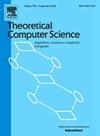扩大了具有内延保证和外延保证的局部完备性分析的适用性
IF 1
4区 计算机科学
Q3 COMPUTER SCIENCE, THEORY & METHODS
引用次数: 0
摘要
局部完备逻辑是一种基于抽象解释的程序分析证明体系。程序语义被任何可证明的后置条件所低估,就像不正确逻辑一样,但它也被这种后置条件的(局部)完全抽象所过度逼近,就像Hoare逻辑一样。因此,任何可衍生的三元组要么证明程序是正确的,要么揭示真正的错误。虽然程序功能相对于抽象域的完备性本质上是外延的,但LCL的规则要求在整个抽象解释器的计算过程中保持局部完备性。这个特性使得LCL分析具有内向性,这意味着它依赖于程序的编写方式。因此,LCL证明系统不能推导出所有的有效三元组。本文通过以下方式解决了这一差异:1)设计新的规则,允许人们在必要时在不同(完整)抽象领域中执行部分内涵分析;2)比较他们的表达能力。值得注意的是,其中一些新规则允许推导所有扩展有效的三元组,从而将可证明的属性集与程序的编写方式解耦。本文章由计算机程序翻译,如有差异,请以英文原文为准。
Broadening the applicability of local completeness analysis with intensional and extensional guarantees
Local Completeness Logic (LCL) is a proof system for program analysis rooted in abstract interpretation. The program semantics is under-approximated by any provable postcondition, like incorrectness logic does, but it is also over-approximated by a (locally) complete abstraction of such a postcondition, like Hoare logic does. Therefore, any derivable triple will either prove the program to be correct or unveil true bugs. While the completeness of a program's function with respect to an abstract domain is inherently extensional, LCL's rules demand the preservation of local completeness throughout the abstract interpreter's computations. This characteristic renders LCL analysis intensional, meaning it depends on the way the program is written. Consequently, LCL proof system may not derive all the valid triples. This paper addresses this discrepancy by: 1) designing new rules that allow one to perform part of the intensional analysis in different (complete) abstract domains whenever necessary; and 2) to compare their expressiveness. Notably, some of these new rules enable the derivation of all extensionally valid triples, thereby decoupling the set of provable properties from the way the program is written.
求助全文
通过发布文献求助,成功后即可免费获取论文全文。
去求助
来源期刊

Theoretical Computer Science
工程技术-计算机:理论方法
CiteScore
2.60
自引率
18.20%
发文量
471
审稿时长
12.6 months
期刊介绍:
Theoretical Computer Science is mathematical and abstract in spirit, but it derives its motivation from practical and everyday computation. Its aim is to understand the nature of computation and, as a consequence of this understanding, provide more efficient methodologies. All papers introducing or studying mathematical, logic and formal concepts and methods are welcome, provided that their motivation is clearly drawn from the field of computing.
 求助内容:
求助内容: 应助结果提醒方式:
应助结果提醒方式:


